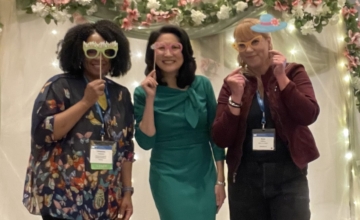with Theresa Vadala, EdD, Head Start Center Director and Executive Director of Child Care Training Consultants, LLC, Las Vegas, NV
Editor’s Note: Recently on the ZTT discussion board, Member Connect, a member asked “Are others across this network of early childhood professionals seeing a slump in energy, attitudes, emotions, etc., currently?” Theresa responded “Absolutely! … As an optimist, I foresee a change in the near future as staff are provided with more support and encouragement throughout the course of the day!” I asked Theresa if she would reflect further on her experience.
The pandemic has certainly caused the world of education to pause and change in response to disruptions in routines and social isolation for children and families. As our staff’s energy has come to a “slump” with this dramatic change in normal routines: staff have lost their smiles, their body language displays a defensive, closed off signal, subdued voice tone, with facial expressions showing uncertainty. Conversations about multiple and extremely challenging student behaviors associated with anxiety and depression have left negative impressions for both children’s and staff’s mental health. Logistical questions expressed by staff reflect uncertainty and a cry for help:
- Who will help us?
- What will they help us with?
- When will they help us?
- Why is it taking so long?
- Where will our help come from?
- How will we get back to something close to normalcy?
As we are all aware, life has its ups and downs. During this “down” we currently face, amid our collective cry for help, we also search for the reignition of passion for working with children. This passion remains planted, embedded in an educator’s heart, mind, and soul. Where is my passion? How do I get my fire back, educators ask! The reignition of passion, that fire that educators once experienced, is still there. It is buried with anger, doubt, frustration, uncertainty, and extreme negativity. So how exactly do I reignite that passion as their leader?
Measures to Boost Morale
Pandemic related obstacles to low staff morale also included lack of clarity and communication. Centers closed, centers open, staff with COVID, COVID-related symptoms, absences, staff shortages, virtual learning for some, in person learning—these have all affected our centers’ method of communication. This unintended lapse in structure caused a gap in our organization’s connection. With this in mind, and no fault to blame, we have an amazing leadership team and coworkers that have come to our rescue.
Measures taken to boost morale are:
- Be transparent about our needs
- Be persistent in asking
- Be ready to accept help
- Be positive
- Be receptive
- Be thankful
Although these intentions seem simple, they must stay at the forefront of our minds. It is our own responsibility to acknowledge our feelings, body and facial language, and be open to ask for help. Our staff now are smiling, singing, sharing, and their disposition has changed overnight. Although, still facing daily challenges, staff outlook is much more positive than before. The lessons we have learned are to keep open communication, be transparent, give recognition to employees, and train managers to be aware of staff morale.
The Reignition of Passion
The reignition of passion consist of several elements. Start by recognizing your body language and facial expressions (smile!). Once cognizant of your personal demeanor, your ability to ask for or receive help will feel welcoming. A positive change in our staff’s “slump” and our workplace environment is due to reaching out to others in the workplace. When a co-worker asked “How are you”—not any situations going on, but simply “you”—a change in one’s disposition takes place. Stories about gardening, pets, and families bring a natural smile to an individual.
In particular, these elements have helped make a significant change with our staff.
- Identifying what you want to change
- Changing your attitude
- Believing that you are able to change your attitude
- Thinking about how your attitude will affect your life
These elements are just the beginning of accepting or being open to receiving help. Although a multitude of training on coping strategies for challenging behaviors and resources have been provided, the one most effective strategy to date was a coworker simply asking, “How are you?”




